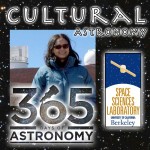Podcaster: Nancy Alima Ali
 Title: Cultural Astronomy – Cultural Perspectives of the Planets
Title: Cultural Astronomy – Cultural Perspectives of the Planets
Organization: Multiverse, Space Sciences Lab, University of California at Berkeley
Links: http://multiverse.ssl.berkeley.edu/, http://www.astroalima.com, http://solarcalendar.org/
Description: Nancy Alima Ali and Dr. Bryan Mendez, both from UC Berkeley’s Space Sciences Lab, explore some cultural associations of the planets. Topics discussed include the names of the planets, the shift from a geocentric to heliocentric view of the solar system and a look at the planet Venus from the perspective of indigenous Maya people of Mexico.
Bio: Nancy Alima Ali, M.Ed., is a Coordinator of Public Programs at Multiverse at the Space Sciences Lab at the University of California, Berkeley. For over 15 years, Ms. Ali has been active in both formal and informal education as a classroom teacher, college instructor, museum educator, curriculum developer and program manager. Ms. Ali has a particular interest in exploring the ways in which multiple worldviews contribute to our understanding of the cosmos. She blogs about the intersection of astronomy and culture at www.astroalima.com.
Guest Bio: Bryan Mendez, Astronomer and Education Specialist with UC Berkeley’s Space Sciences Lab, hails from Traverse City, Michigan where the beautifully dark night sky enthralled him from a very early age and inspired him to study astronomy. He graduated from the University of Michigan in 1997 with degrees in Astronomy, Physics, and Saxophone Performance. Bryan continued his education at the University of California at Berkeley, where he researched the large scale flow of galaxies in the nearby Universe by measuring their distances. He received a Ph.D. in Astrophysics from UC Berkeley in 2002. Bryan works at UC Berkeley’s Space Sciences Laboratory educating and inspiring others about the wonder and beauty of the Universe. His work in space science education and public outreach involves developing programs for the public and resources for K-12 classrooms, and conducting professional development for science educators. Bryan is bicultural, of Mexican and European backgrounds, and strives to foster diverse perspectives in his work.
Today’s sponsor: This episode of “365 Days of Astronomy” is sponsored by — no one. We still need sponsors for many days in 2015, so please consider sponsoring a day or two. Just click on the “Donate” button on the lower left side of this webpage, or contact us at signup@365daysofastronomy.org.
Transcript Outline:
Welcome and introductions
Which planets can be seen with the unaided eye
Websites and apps that can help you find the planets: www.earthsky.org, www.stellarium.org
Cultural associations of the names of the planets
Shift from beliefs in a geocentric (Earth-centered) to a heliocentric (Sun-centered) solar system
Venus & Maya astronomy:
The Observatory or El Caracol at Chichen Itza
Dresden Codex
Observing Venus in the morning sky and during daytime
Closing
End of podcast:
365 Days of Astronomy
=====================
The 365 Days of Astronomy Podcast is produced by NUCLIO. Audio post-production by Richard Drumm. Bandwidth donated by libsyn.com and wizzard media. You may reproduce and distribute this audio for non-commercial purposes. Please consider supporting the podcast with a few dollars (or Euros!). Visit us on the web at 365DaysOfAstronomy.org or email us at info@365DaysOfAstronomy.org. This year we celebrate cosmic light as light is our info messenger in the universe. Join us and share your story to celebrate the International Year of Light. Until tomorrow! Goodbye!


Trackbacks/Pingbacks